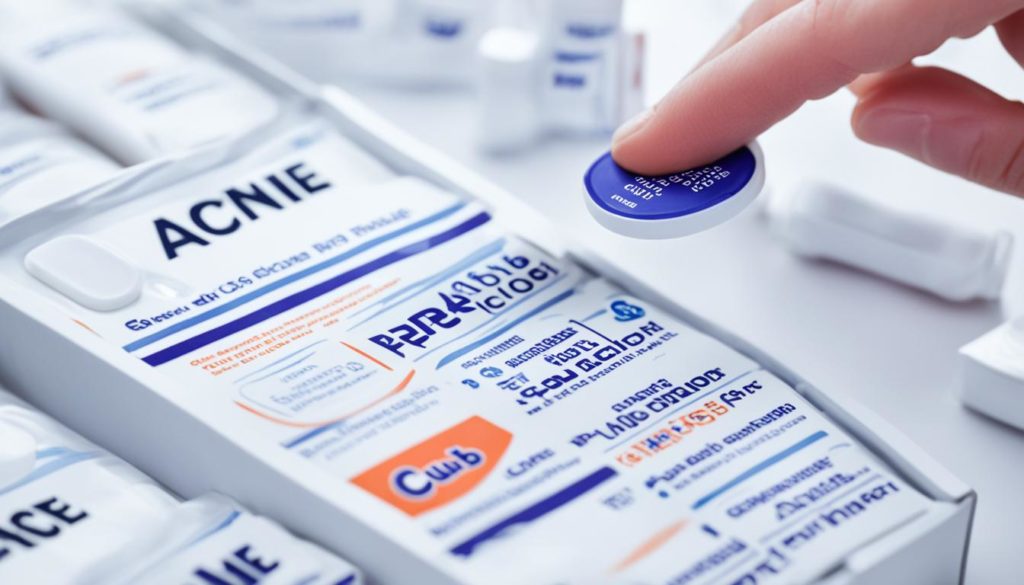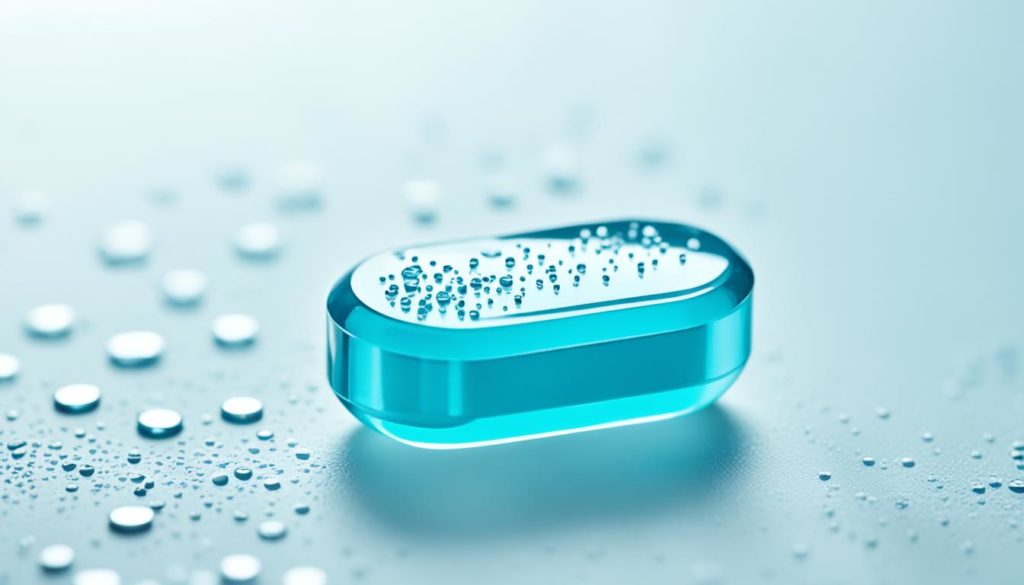Did you know nearly 80% of people in the U.S. will face acne at one time? This high number has led many to look for effective cures. The acne treatment pill is now a top choice, bringing hope to those dealing with tough skin issues.
Oral medications are popular for acne since they work from the inside out. Unlike creams, these pills tackle acne’s root causes like hormone issues and inflammation. They can help with all acne types, including hormonal, cystic, and inflammatory, offering a strong clear skin solution.
Key Takeaways
- Nearly 80% of Americans will experience acne at some point.
- Acne treatment pills are highly effective in targeting acne internally.
- Oral treatments address underlying causes such as hormonal imbalances and inflammation.
- These pills can treat various acne types, including hormonal, cystic, and inflammatory.
- Oral acne treatments offer a comprehensive solution compared to topical methods.
Understanding How Pills Work to Clear Up Acne
Many people use oral meds to fight off stubborn acne and boost skin health. These drugs operate in different ways to tackle the main reasons behind acne. Knowing the science helps explain why they’re effective.
The Science Behind Acne Formation
Acne starts when oil and dead skin block hair follicles, creating comedones. If these follicles get blocked, bacteria like Propionibacterium acnes grow. This causes inflammation and the familiar red, swollen pimples. Oral meds work by attacking these issues, reducing inflammation and bacterial growth, leading to clearer skin.
Role of Hormonal Balances
Hormonal shifts, especially an uptick in androgens, significantly impact acne’s start and severity. These hormones make the sebaceous glands create more oil. Treatments for hormonal acne work by fixing these hormone imbalances, cutting down oil production. This way, the medicines deal with acne on a broader scale.

Popular Acne Treatment Pills on the Market
Finding the best acne treatment can be tough with so many choices. Knowing the difference between prescription acne pills and over-the-counter options is important. Today, we’ll explore the top options.
Prescription vs. Over-the-Counter Options
It’s vital to know the difference between prescription and over-the-counter acne treatments.
- Prescription Acne Pills: These include drugs like isotretinoin and hormonal treatments. Isotretinoin, also known as Accutane, is great for serious acne. Women who have hormonal acne might use hormonal therapies.
- Over-the-Counter Acne Solutions: You can buy these easily and they often have salicylic acid or benzoyl peroxide. These ingredients help with inflammation and can clear up less severe acne.
Recommended Brands and Products

| Brand | Prescription or OTC | Key Ingredient | Reviews |
|---|---|---|---|
| Accutane | Prescription | Isotretinoin | Highly effective, especially for severe acne |
| ProactivMD | OTC | Adapalene | Great for mild to moderate acne |
| Clearasil | OTC | Salicylic Acid | Popular for spot treatments |
| Ortho Tri-Cyclen | Prescription | Norgestimate and Ethinyl Estradiol | Effective for hormonal acne in women |
Best Pill for Acne: What to Look For
Finding the best acne pill means knowing which ingredients work well. You should look for ingredients like retinoids and antibiotics. They help lessen inflammation and fight bacteria.
Choosing the right acne pill depends on your specific needs. Think about your skin type, how severe your acne is, and if you’ve had issues with antibiotics before. Talking to a dermatologist can ensure the treatment works for you.
Here are vital things to keep in mind when choosing an acne pill:
- Active Ingredients: Search for retinoids, like isotretinoin, to help reduce oil and clear pores. Antibiotics, such as doxycycline, can cut down on bacteria and swelling.
- Skin Type: Make sure the pill fits your skin type. Some are better for oily or combo skin.
- Acne Severity: The level of your acne matters. Light acne might need only creams, but severe cases could require pills.
- Antibiotic Resistance: Think about past treatments and how well they worked. Your antibiotic history can shape your medication choice.
In short, picking the right acne pill means looking at effective ingredients and thinking about your specific needs. Below, you’ll find a table comparing popular acne-fighting ingredients:
| Active Ingredient | Description | Common Brands |
|---|---|---|
| Isotretinoin | A retinoid that decreases oil production and opens pores. | Accutane, Roaccutane |
| Doxycycline | This antibiotic helps reduce bacteria and cuts down on inflammation. | Oracea, Vibramycin |
| Spironolactone | It battles acne linked to hormone issues. | Aldactone, CaroSpir |
Comparing Acne Pills: Effectiveness and Reviews
It’s key to consider both user reviews and science when looking at acne pills. A mix of real-life feedback and clinical evidence gives a full picture of how well they work.
User Testimonials and Experiences
Different people have shared their thoughts on acne meds, with outcomes varying. Some noticed big changes in weeks, while for others, it took longer. People often discuss how their skin type, acne severity, and following the treatment plan affected results.
“After trying several over-the-counter products, switching to a prescription acne pill was a game-changer. My skin cleared up dramatically in just two months.” – Anonymous User
In reviews, many say acne pills helped reduce oil, lessen redness, and stop new pimples. These comments offer insight into how acne pills actually work for people.
Clinical Study Results
Scientific studies provide hard data on how effective acne pills are. They show how successful various drugs can be and their impact over time. Researchers also compare pills to find the best for each skin type and acne level.
| Acne Pill | Success Rate | Duration of Study |
|---|---|---|
| Doxycycline | 75% | 12 weeks |
| Minocycline | 68% | 12 weeks |
| Spironolactone | 85% | 24 weeks |
| Isotretinoin | 90% | 16 weeks |
Using this information, doctors can suggest the best acne treatment for their patients.
Pill Clear Up Acne: How Long Does It Take?
Knowing how long it takes for acne pills to work is key. It varies by person. Typically, improvements can be seen in a few weeks. Full benefits are often seen after months of regular use.
Typical Treatment Duration
Acne medication usually works between 6 to 12 weeks. In this time, many see fewer acne spots and smoother skin. Sticking to the plan is crucial to get the results you want from your acne.
- First Month: Little change might be seen. Some might notice their acne gets slightly worse as skin adjusts.
- Second to Third Month: A visible reduction in acne and less inflammation. Clearer skin begins to show.
- After Three Months: Most users see significant improvements. Yet, ongoing treatment is often needed for lasting clear skin.
Factors That Influence Results
Several things can affect how well and quickly acne pills work. These things can speed up or slow down results. Factors include:
- Adherence to Medication: It’s very important to not miss doses. Skipping pills can slow progress.
- Lifestyle Choices: What you eat, stress, and how you care for your skin all play a role in the acne treatment timeline.
- Individual Skin Type: Everyone’s skin is different. This means treatment results can vary from person to person.
- Concurrent Treatments: Using other acne solutions alongside pills can help or sometimes interfere with the results.
In summary, acne medication takes time to work and results can differ. Setting realistic goals and working with a dermatologist will help tailor treatment to your needs.
Potential Side Effects of Acne Pills
Choosing oral acne treatments means you need to know about possible side effects. These effects can differ a lot based on the medication. So, it’s important to watch closely and check in with a doctor often.
Common Side Effects
Side effects from acne pills can be small annoyances or big problems. Common issues include:
- Gastrointestinal problems: Things like nausea, diarrhea, or vomiting happen often.
- Skin reactions: You might see dry skin or become more sensitive to the sun.
- Hormonal changes: Birth control for acne could make your breasts tender or alter your period.
- Mood changes: Isotretinoin could lead to mood swings or even depression.
Managing and Monitoring Side Effects
It’s key to manage and check on side effects with your dermatologist. Here’s how you can keep side effects at bay:
Always talk and consult with your dermatologist. This lets you change the treatment as needed.
Here are ways to watch how the treatment is going:
- Regular check-ups: Go see your doctor often to see how things are going.
- Symptom diaries: Write down any side effects. Talk about them when you see your doctor.
- Blood tests: You might need tests to watch for big changes, especially with strong meds like isotretinoin.
Consulting Your Dermatologist for a Prescription Acne Pill
Seeing a dermatologist is key when you want to tackle acne the right way. They can craft a treatment plan just for you, considering your skin type and medical past.
Dermatologists know all about the best treatments out there. They look at your health history and skin issues to pick the safest, most effective medicine for you.
- Conduct a thorough assessment of your acne condition.
- Evaluate your previous treatments and their outcomes.
- Formulate a personalized acne medication regimen, considering any potential side effects.
- Offer follow-up appointments to monitor progress and make necessary adjustments.
Getting your acne medication from a dermatologist means treatments will fit your specific needs. This approach helps in fighting acne more successfully, lowering the risk of problems.
Let’s look at why it’s good to get a dermatologist’s help for acne treatment:
| Benefits | Description |
|---|---|
| Personalized Treatment | Medication is tailored to your specific skin type and condition. |
| Professional Monitoring | Regular follow-ups ensure the treatment plan is effective and adjustments can be made as needed. |
| Comprehensive Care | Considers all aspects of your health and skin history. |
| Reduced Side Effects | Minimizes risks by considering potential contraindications and interactions. |
Choosing treatments recommended by a dermatologist means you’re on your way to clearer skin. Your dermatologist is a crucial ally in finding the best, safest acne medication for you.
Cost of Acne Pills: What You Need to Know
Affordability of acne medication is key for effective treatment on a budget. The price tag on acne pills changes if they are prescription or over-the-counter. Prescription ones like doxycycline and spironolactone can seem expensive but yield quicker, more targeted outcomes.
Many factors affect the cost of treating acne. These include brand reputation, dosage, and whether your insurance covers it. There are cheaper, generic versions, like generic doxycycline. Using insurance or opting for generics can help lower your costs.
Pharmaceutical companies sometimes offer assistance to lower your expenses. Their programs might reduce the price or offer free medication, based on your eligibility. To find more affordable solutions, check out this comprehensive guide on acne meds. Smart choices mean treating acne doesn’t have to empty your wallet.
FAQ
What are the most effective oral medications for acne?
The best oral meds for acne are isotretinoin, birth control pills, and antibiotics like doxycycline. They help with tough acne types, including cystic and hormonal acne.
How do oral medications for acne work?
Oral acne drugs tackle acne from different angles. Antibiotics cut down on bacterial growth. Hormonal therapies balance your body’s hormones. Isotretinoin reduces oil production.
Are prescription acne pills more effective than over-the-counter options?
Yes, prescription pills do better for severe acne. They have more of the active stuff. Over-the-counter products like salicylic acid work for lighter acne only.
Which brands are recommended for treating acne?
Top acne treatment brands include Accutane for severe cases, Ortho Tri-Cyclen for hormone-related acne, and doxycycline. Dermatologists and users alike trust these.
What should I look for in an acne treatment pill?
Look for retinoids, antibiotics, or hormones in acne pills. Think about your skin type and acne’s severity. Always talk to a dermatologist first.
Are user testimonials and clinical studies available for acne medications?
Yes, you’ll find many user stories and clinical trial results. They show how well treatments work and user satisfaction. Clinical trials provide data on success and long-term effects.
How long does it typically take for acne pills to show results?
Results from acne pills can take 4-8 weeks to show. Full results may take months. It depends on the pill type, how well you follow the treatment, and your body’s reaction.
What are the common side effects of acne pills?
Acne pills can cause upset stomach, dry skin, and more sun sensitivity. Isotretinoin might affect your mood. Hormonal pills could lead to blood clots. Watch out for side effects.
How can I manage and monitor side effects from acne medications?
To handle side effects, keep in touch with your doctor. Follow your medicine plan closely. Changes in lifestyle or treatment might be needed.
Why is it important to consult a dermatologist for prescription acne pills?
Seeing a dermatologist gets you a plan that fits your skin and acne type. They choose the right meds for you, making treatment effective.
How much do acne pills typically cost?
Acne pill prices vary. Over-the-counter options are cheaper than prescriptions. Brand, strength, and insurance affect the cost. To save money, think about generics and support programs.


